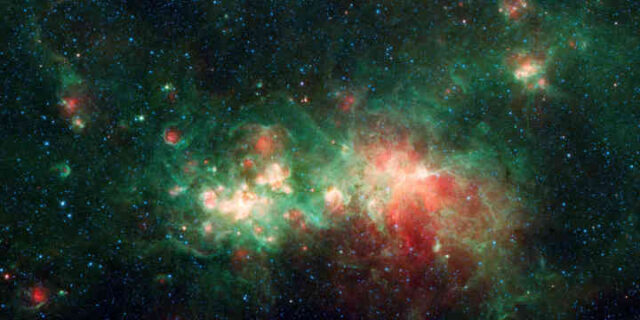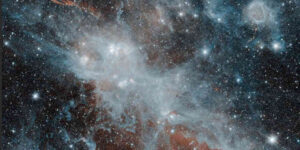Sherlock Holmes said (several times) that “when you have excluded the impossible, whatever remains, however improbable, must be the truth.”
But what if every option seems impossible? In this, and a few other posts, I want to look at questions relating to belief in God where all options seem impossible.
Defining the universe
For this discussion, I am defining the universe as everything physical that exists. “Physical” includes matter, energy, space and time. If what we call “our universe” arose out of another “universe”, as many cosmologists suspect, then I am including all such “universes” in the universe.
What caused the universe?
This age-old question has been well analysed by philosophers. In essence, we can define three options via two simple questions:
Did the universe have a cause?
Either it did or it didn’t. Those are the only options.
If it had a cause, was it physical or not?
Again there are only two options. Either there was a physical (material or energy) cause, in principle able to be addressed by science, or the cause was something non-physical.
Impossible?
When we try to choose between these three exhaustive options, we come up against difficulties for each one.
1. No cause?
Perhaps the universe doesn’t have a cause. Perhaps it has always existed. Or maybe it just came into existence for no reason, something like a quantum event.
But there are significant problems with this view.
- The human race understands the physical world quite well now, and things just don’t happen without a cause or a reason.
- Even quantum events have a cause, a quantum field, even if we cannot predict when an event will occur. If there is no quantum field, there can be no event.
- So our universe existing without reason or cause contradicts everything we know about the universe from science.
- Some say that we can’t apply to the universe as a whole what we know about cause from components of the universe. But I can’t see why physical laws which apply everywhere within the universe don’t thus apply to the universe as a whole.
- There are good reasons why an eternal, beginningless universe doesn’t resolve the issue.
- The universe doesn’t look like it is beginningless. It looks like it is “running down”, and the laws of thermodynamics confirm this.
- If it is infinitely old, then everything that could possible happen would have already happened in infinite time. The universe would be rarefied “mush” where there was no energy difference to allow anything to happen.
- Most cosmologists’ models of the universe suggest there was a beginning.
- It is impossible to count to infinity, so it is equally impossible to count back from now to negative infinity. If this is impossible, how could we ever get from infinite past to now?
- There are mathematical difficulties with the concept of infinite numbers of things (like days).
- If these is no cause, then there is no explanation. But any hypothesis which lacks explanatory power is a poor hypothesis. Saying the universe had no cause is admitting that other options which explain more must be preferred.
2. A physical cause?
If the universe had a physical cause, then that cause must have been part of the universe, for we have defined the universe as everything physical.
So this option actually means that the universe caused itself.
“Cause” is a difficult concept to fully define. But it seems to be true that for a cause to have an effect, that cause must exist. A non-existent cause cannot actually cause anything because it doesn’t exist.
So this option seems totally contrary to logic. It simply doesn’t make sense.
3. A non-physical cause?
The difficulties associated with these first two options are the basis for the Cosmological argument for the existence for God, or for at least a non-physical first cause. If the universe had a cause, which seems logical, then that cause had to be non-physical.
But some of the same difficulties apply here too.
The obvious question to ask is “What caused God?” If we ask about the cause of the universe, then it is reasonable to ask the same question about God.
And the only answer can be that God is eternal, that he didn’t have a cause because he/she is the ultimate cause of everything else. Which of course isn’t so much an explanation as a mystery.
Further we can ask, if God has existed since past infinity, don’t the same arguments about infinity apply to him/her? Doesn’t it make God impossible too?
But there is one big difference. The universe is physical and exists in time, which is what makes its self existence so impossible. If God isn’t physical and doesn’t exist in time, the arguments don’t apply in the same way, and maybe don’t apply at all.
So the God explanation has more mystery but is less impossible.
Can we choose between the options?
Theists, including me, conclude that God is the better of the three “impossible” options.
We live in the universe and interact with it every day. We sort of understand it. We know how it operates, by cause and effect according to physical laws. We can say with confidence that the universe causing itself, or having no cause, doesn’t make physical sense. We can know that if we say the universe just is, it is a brute fact, that we have conceded that we have no explanation.
And therefore no reason to believe it is true.
We can ask the same questions about God, but we cannot answer them with the same confidence. We don’t know if God exists in time or created time. We don’t know if God needs a cause. It may make perfect sense to say God just is, as a brute fact. We just can’t know.
Philosophers put all this into clearly defined philosophical concepts. The universe is contingent (it could have been different and depends on other things for its existence), whereas God is necessary (couldn’t have been different and doesn’t depend on anything external for his/her existence). A necessary being is a sufficient explanation of itself, but a contingent being demands an explanation.
Choosing in uncertainty
Very little in life is certain. We learn to live with uncertainty. Science uses statistics such as 95% confidence limits to define that uncertainty to acceptable levels. But outside science, we still make choices, not with certainty, but according to what is more likely. Which politicians to vote for when it isn’t totally clear that either will do good? Which job offer to accept? And so on.
So here. All options are difficult. But our reason tells us that if God exists, he/she would be way beyond our comprehension, and therefore self existence isn’t unreasonable. Whereas the universe, of which we are a part, is much more explicable, and seemingly impossible to be self-existent.
So in the end, I find it quite easy to believe that a God who is beyond my comprehension could have existed without reason and created the universe. I find it impossible to believe that the universe has no cause and no explanation.
I think the impossibility of the universe is a clue to reality, just as the apparent impossibility of God is a clue to his/her existence.
What about you?
Photo: The star-forming nebula W51 is one of the largest “star factories” in the Milky Way galaxy. (NASA)




